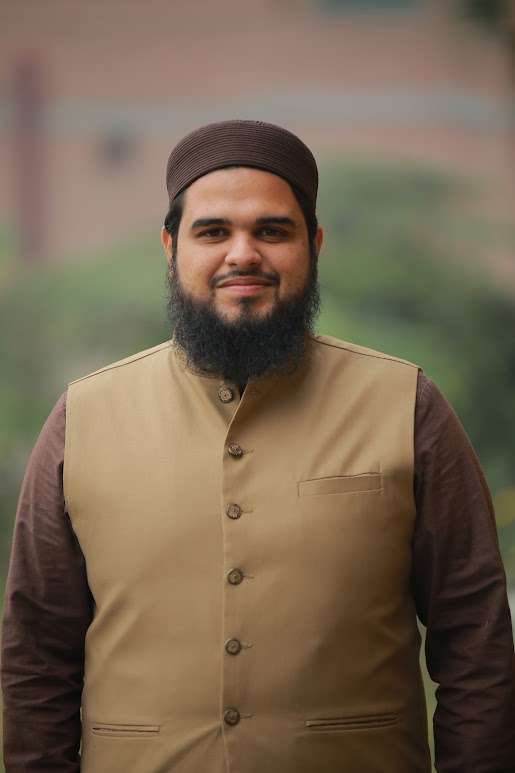Name: Shujaa Waqar
Designation: Lecturer
Department: Economics
Email ID: shujawaqar@fccollege.edu.pk
Office No.: E-218/2
Education
MS Economics, International Islamic University, Islamabad, Pakistan
MSc Economics (Gold Medalist), International Islamic University, Islamabad, Pakistan
Brief Profile
Besides his strong academic background, his on-the-job experience and professional training of almost 6 years have made him a dedicated and resourceful educator with a solid commitment to student's social and academic development. He can analyze complex situations regarding data analysis, estimations, prepare reports, formulating plans to aid economic issues, and drawing accurate conclusions for policy recommendations. He has worked on time-series, panel, and cross-sectional data sets in Eviews, STATA, SPSS and OXMetrics.
After completing a Masters in Islamic Sciences and Arabic from Jamia Darululoom Karachi, Mr. Shujaa Waqar has completed his M.Sc. and MS Economics from International Islamic University, Islamabad. During his master’s thesis, he worked as a Research Assistant in a HEC-assisted project on “Technological Spillover Effect on Economic Growth: Exploring the Role of Absorption Capacity of Domestic Labor”. After completing his Master's, he worked as a Research Assistant at the Centre of Excellence for CPEC, a joint project of the Ministry of Planning, Development and Reforms, Islamabad, and the Pakistan Institute of Development Economics (PIDE), Islamabad. Along with the research activities at the Centre of Excellence he has been closely working with the National Vocational and Technical Training Commission (NAVTTC), GIZ and UNDP. With this, he joined the International Islamic University as a visiting faculty. He then joined the SDG Tech lab at Information Technology University (ITU), Lahore as a Research Associate. He worked with UNFPA and UNDP on a project on satellite imagery and multidimensional poverty index. Currently, he is working as a Lecturer in the Department of Economics at Forman Christian College (A Chartered University), Lahore and finding opportunities for PhD in Economics.
Research and Publications
- Zia, M. M., Malik, B. A., & Waqar, S. (2018). Special Economic Zones (SEZs): A Comparative Analysis for CPEC SEZs in Pakistan. Pakistan J. Soc. Sci, 9, 37-60. (https://uog.edu.pk/downloads/journal/5_Special_Economic_Zones_SEZs.pdf)
- Aziz, Y., Mansor, F., Waqar, S., & Haji Abdullah, L. (2020). The nexus between zakat and poverty reduction, is the effective utilization of zakat necessary for achieving SDGs: A multidimensional poverty index approach. Asian Social Work and Policy Review, 14(3), 235-247. (https://onlinelibrary.wiley.com/share/JK9MWFD8KBQGQNQJWACR?target=10.1111/aswp.12212)
- Waqar, S., Ahmed, S., & Badshah, I. (2021). Chinese FDI for Infrastructure Development in Africa–Assessing the Impact of Cooperation. Studies of Applied Economics, 39(3). (https://ojs.ual.es/ojs/index.php/eea/article/view/3761)
- Adil, S., Bhatti, A. A., Waqar, S., & Amin, S. (2022). Unleashing the indirect influence of oil prices on food prices via exchange rate: New evidence from Pakistan. Journal of Public Affairs, 22(4), e2615. (https://onlinelibrary.wiley.com/share/KMUFTU5ANVFDC2MIZ6BA?target=10.1002/pa.2615)
- Waqar, S., Qayyum, W., Haq, M., & Amin, B. (2022). Asymmetric pass‐through between oil and transport prices: Evidence from a nonlinear analysis. Journal of Public Affairs, 22(4), e2628. (https://onlinelibrary.wiley.com/share/NUY6NA8T6HRC4GHXF2FS?target=10.1002/pa.2628)
- Shabbir, S., Waqar, S., Ahmed, F., & Ahmed, S. (2021). Policy Reforms in Public Institutions to Regulate SEZ under CPEC: A Learning Example from Africa. Studies of Applied Economics, 39(8). (https://ojs.ual.es/ojs/index.php/eea/article/view/5503)
- Waqar, S., Badshah, I., Bandeali, M. S. M., & Ahmed, S. (2021). The Impact of Special Economic Zones (SEZs) on Economic Growth: Where the Absorption Capacity of Domestic Labor Stands?. ETIKONOMI, 20(2), 259-274. (https://journal.uinjkt.ac.id/index.php/etikonomi/article/view/19386)
- Waqar, S., Shabbir, S., & Amin, B. (2022). Testing Employment Growth in the Tourism Industry via Regional Connectivity in Pakistan under CPEC. Government College Economic Journal (https://gcu.edu.pk/pages/gcupress/economic-journal/volumes/2022/4.pdf)
Projects
- Technological Spillovers Effect on Economic Growth: Exploring the Role of Absorption Capacity HEC assisted project at International Islamic University, Islamabad
- CPEC Skill Development Challenges and Way Forward for an Inclusive Employment Strategies A collaboration of Centre of Excellence for CPEC and GIZ
- Model for Satellite Based Sensing Imagery to Identify the Economic Condition of Slums A collaboration of ITU, UNDP and UNFPA.
